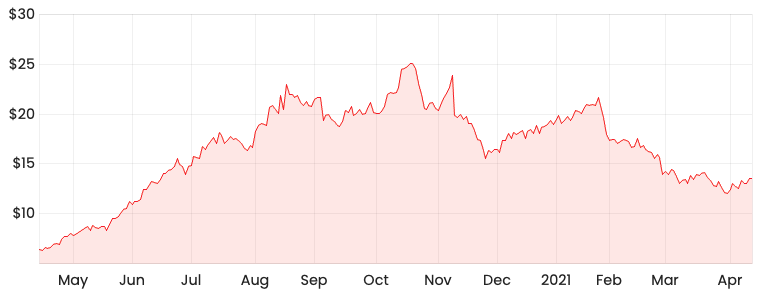Despite the fact the share price of online retailer Kogan.com Ltd (ASX: KGN) has lost nearly half of its value since October last year, long-term investors have been handsomely rewarded since the company listed on the ASX at around $1.60 per share, representing a gain of roughly 750%.
So, was Kogan just a once-off COVID-19 beneficiary or is there likely to be more upside?
Kogan share price

What’s to like about Kogan?
Part of the Rask investment philosophy involves looking at companies that operate in structurally growing sectors of increased importance.
An important metric often looked at to gauge the size of the potential market opportunity is the Total Addressable Market (TAM) and its ability to grow with the businesses.
Kogan has a long history of identifying opportunities and broadening its range and including new verticals such as Kogan insurance, Kogan Money, Kogan cars and Kogan Mobile just to name a few. Every time a new product line added, it removes the need for customers to have to shop elsewhere and promotes repeat spending through Kogan’s platform.
Kogan saw a huge 76.8% YoY increase to 3 million active customers in the 6 months to 31 December 2020.
This is particularly important because it now gives Kogan the opportunity to further expand its product line while there are so many more Australians familiar with its private label and third party brands. This will be a key enabler of repeat purchasing and will hopefully mean more customers can fulfil more of their shopping needs through one retailer.
Capital light business model
Kogan’s warehousing and logistics operation are capital-light and quite scalable that requires minimal resource requirement.
Once an order is placed and payment has been verified, the order is sent to the warehouse via its technological infrastructure and an automated process despatches the order, requiring no involvement from Kogan personnel.
Management indicated years ago that this would be a key driver of operating leverage and it seems as though Kogan is starting to see some improvement in its earnings before interest, tax, depreciation and amortisation (EBITDA) margins as it grows larger.
Summary
The usual headwinds for retail include things such as sluggish wage growth and higher unemployment, which reduces discretionary spending levels.
I don’t think these risks should be ignored, but it’s interesting that companies like Kogan and JB Hi-fi Limited
(ASX: JBH) were strong performers prior to COVID-19 even under these tough macroeconomic conditions.
For more reading on Kogan, click here to read: 2 high quality ASX retail shares to watch in April.










